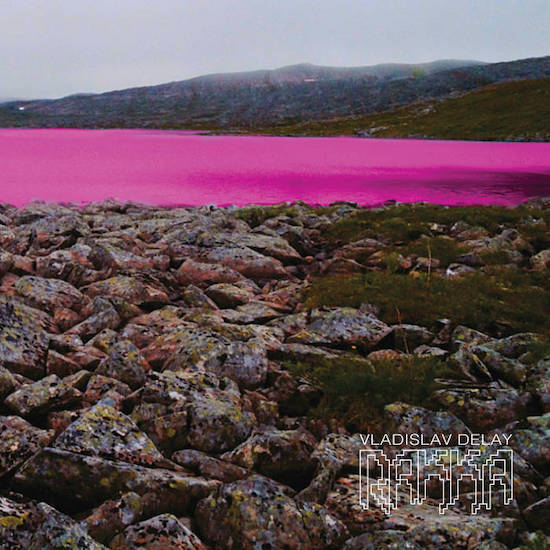Many music releases that have been directly inspired by the landscapes beyond the Arctic Circle are often at pains to emphasize its “space”, that is, the bleak and barren landscapes where any kind of organic life is at a premium at best. From Chris Watson’s beguiling ‘Vatnajökull’ on his 2003 album Weather Report and the early sounds of Tim Hecker, to Thomas Köner’s albums Permafrost and Novaya Zemlya, these works promote a sublime stillness, a geological emptiness where time and location have no real meaning has no real meaning any more. You’re placed dead centre in a landscape that has a haunting, abstract serenity on the surface, yet underneath conceal layers of almost imperceptible levels of movement, be it the resonant tones of the wind hitting the trees, or the droning, cracking sounds of compressed glacier ice.
Rakka, the new album from Sasu Ripatti aka Vladislav Delay, could be added to this lineage, but the polar world it portrays is anything but still and serene. Inspired by his extended hiking trips beyond the arctic circle, he states that this is not a “nature” record in the sense of capturing a field recording form of realism. Instead Vladislav Delay has produced a subjective album that acts as a mediator between the severe immanence of arctic tundra, and the irreversible encroachment of anthropocenic climate change. Rakka is an expression of a will to power in a changing landscape at the edge of the world.
For Ripatti, this represents his first full return as Vladislav Delay since 2015’s VISA, that, save for some soundtrack work and a collaborative album with Sly and Robbie, saw him enter a self-imposed exile from the punishing rigours of making and releasing music, moving back to his native Finland with his family in order to take a break and live a little. But despite the break, there are some motifs to the Vladislav Delay “sound” that are still evident. Using longform swathes of ambient sound as an underlying canvas, Ripatti splatters these sounds with tight glitching loops of distorted sounds that pool together into irregular patterns and rhythms.
While the basic structure is still evident on Rakka, those sounds and samples are blasted out into a never-ending horizon of chaos, a landscape where sheet blasts of wind strip your flesh to the bone, to the eruptions of life that cling onto icy rock fields that go on forever. Tracks such as the self-titled ‘Rakka’ and ‘Raatajakav’, explode with the immediacy of contorted industrial bruisings that froth and howl, while pounding rhythms splutter overland like a howling train. On ‘Raajat’ and ‘Rakkine’ meanwhile tightly wound blast beats literally explode over a ruptured landscape as hollowed out bones scrape on sharp rock edges. If those early Scandinavian black metalers discovered cracked DAW software instead of guitars, this Rakka would definitely be something near to the primal rage they were trying to go for. But while black metal tries to capture nature as a nihilistic instrument of cosmic pessimism, on Rakka there is a breath-taking intense delirium, an immediacy as tiny promethean pockets of life struggle to endure in a raw ecosystem and the elemental nature in the raw.
Rakka is not just all chaotic noise and fury though. ‘Rakkile’, when it arrives, comes almost as a sort of relief, a lull in the proceedings complete with alien, rasping drones pass over a haunting stillness. This is followed with ‘Rampa’, possibly the most structured moment in the album, which is also the most “electronic” in the way it veers into industrial techno circles with elements of Ben Frost-style cinematic machinations as your skulled assaulted with galloping drums, pounding breakdowns, and malfunctioning klaxons. For me, it’s a highpoint in the album for the way it somehow manages to portray a libidinal drive that is telling of our current moment, a drive that is incessant and ceaseless in its moment, yet in a state of utter collapse and annihilation at the same time.
With Rakka, Vladislav Delay has created an arresting album of sheer punishing density that encapsulates the ecological pressures of a land that is brutal and unforgiving at the best of times, but occasionally encompass moments of estranged beauty (Hence the connection between the ambient and the arctic worlds). But now there are added layers of disorder thrown into the mix that are expose levels of anxiety and unease that is meant to rupture us from our stasis and torpor. Rakka is putting us all on notice.


